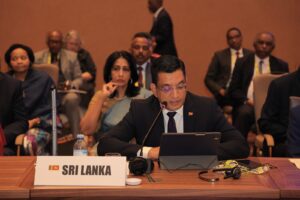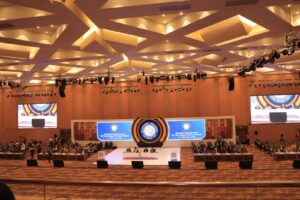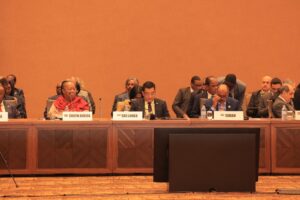


Foreign Minister Ali Sabry addresses the Meeting of the Foreign Ministers of the Non-Aligned Movement in Kampala
January 18, 2024
Foreign Minister Ali Sabry stated that it is essential to ensure that the Non Aligned Movement continues to play a significant role in multilateralism, particularly on issues of importance to the global South, when addressing the Ministerial Meeting of the 19 Summit of the Non-Aligned Movement (NAM) that is currently ongoing in Kampala, Uganda from 17 to 18 January 2024.
The Republic of Uganda assumed the Chairmanship of the 19th Summit of the Heads of State and Government of the NAM which is being convened under the theme “Deepening cooperation for shared global affluence.”
Recalling that Sri Lanka was a founding member of the Movement and had hosted the 5th NAM Summit of Heads of State and Government in 1976, Minister Sabry reiterated that non-alignment is the cornerstone of Sri Lanka’s foreign policy. He further stated that contemporary global crises have brought the fragilities of the world to the forefront and that this has magnified the relevance of the Movement, as never before.
He called on the NAM Member States to speak in one voice when the very principles on which the Movement is based are challenged and emphasized the importance of unity and solidarity among the Members. He reaffirmed Sri Lanka’s solidarity with the people of Palestine during the ongoing humanitarian crisis in Gaza and stated that Sri Lanka will continue to support them in their quest to realize their inalienable right to Statehood.
The Ministerial Meeting was preceded by the Senior Officials Meeting where the Sri Lanka delegation was led by Foreign Secretary Aruni Wijewardane. The Senior Officials meeting, held from 15 to 16 January 2024 in Kampala, negotiated and finalized the Outcome Document of the Summit and the Kampala Declaration. Both of these documents will be presented to the Heads of State and Government of the Non-Aligned Movement (NAM) when they meet from 19 to 20 January 2024.
President Ranil Wickeremesinghe is scheduled to address the Summit of the Heads of State and Government on 19th January 2024.
On the sidelines of these meetings, Foreign Minister Sabry held bilateral discussions with the Foreign Minister of Uganda, Odongo Jeje Abubakher, Foreign Minister of Pakistan, Jalil Abbas Jilani and the Foreign Minister of Algeria, Ahmed Attaf. The Foreign Minister is also scheduled to address the Meeting of the NAM Ministerial Committee on Palestine, today, 17th January 2024.
The NAM which currently consists of 120 Member States is based on the Bandung Principles and aims to advance the interests of developing countries.
Ministry of Foreign Affairs
Colombo
17 January 2024
……………………………………………………….
Ministerial Meeting of the 19th Summit of Heads of State & Government of the Non-Aligned Movement (NAM)
Statement by Hon. Ali Sabry, Minister of Foreign Affairs of Sri Lanka
17-18 January 2024, Kampala
H.E. Gen. Odongo Jeje Abubakhar, Minister for Foreign Affairs of the Republic of Uganda,
H.E. Jeyhun Bayramov, Minister of Foreign Affairs of the Republic of Azerbaijan,
Excellencies,
I wish to congratulate the Republic of Uganda on the assumption of the chairmanship of the Non Aligned Movement (NAM) and to extend the fullest cooperation and support of Sri Lanka during Uganda’s chairmanship. I also wish to thank Your Excellency for the excellent arrangements made for the Summit in the beautiful city of Kampala.
We appreciate the role played by the Republic of Azerbaijan as the chair of the NAM for the past four years, particularly, during a period of immense challenges.
Excellencies, as we know global challenges will always persist. However, we must ensure that strong leadership is provided to address these challenges and we must not shy away from taking the correct decisions – the correct decisions for the Global South. Today, the NAM comprises a near two-thirds of the Member States of the United Nations – and it is essential to ensure that the Movement continues to play a significant role in multilateralism, particularly on issues that are relevant to the South.
I am pleased to recall that Sri Lanka was a founding member of the Movement and hosted the 5th Summit of the Heads of State and Government in 1976. Non-alignment, Mr. Chair, forms a cornerstone of Sri Lanka’s foreign policy and we are aware of the sensitivities of leading the Movement in a fragile international environment. It is our belief that the prevailing fractured global stage has magnified the relevance of this Movement, as never before.
In this context, the theme of this Summit “Deepening cooperation for shared global affluence” is relevant and the focus is timely. We see the Chair’s vision of a ‘stronger and united NAM that contributes to a better world for all’ as a clear pathway to realize it as enshrined in the theme.
Excellencies,
The after effects of the COVID pandemic, exacerbated by the global financial and economic crisis, deteriorating international security, complex humanitarian crises and a weak multilateral framework have brought the fragilities of our world to the forefront – and the ever-expanding inequalities and the divide between the North and South. The status quo warrants our renewed commitment to the principles of the NAM.
It is also important that we speak in one voice when the very principles on which this Movement is based are challenged. Sri Lanka is appalled by the situation in Palestine and the dire humanitarian situation. We are pleased that all the amendments proposed by Palestine to the outcome document of this Summit were agreed upon with overwhelming support. Sri Lanka reaffirms our solidarity with the Palestinian people and the commitment to continue supporting them in their quest to achieve their inalienable rights. A lasting solution to the question of Palestine, based on internationally-endorsed parameters enshrined in the relevant UN resolutions, must remain a priority for our Movement.
NAM must emphasize the importance of unity and solidarity among its Member States and we in the Global South must work together to address global issues of relevance to us. The promotion of South-South Cooperation should be prioritized in order to enhance collaboration among developing countries, fostering partnerships in areas such as trade, investment, technology transfer and capacity building.
Excellencies,
As a country that suffered at the hands of terrorism for over three decades, Sri Lanka reiterates its commitment to the NAM’s principled position to the fight against terrorism in all its forms and manifestations. It is the obligation of all Member States to prevent and suppress such acts and contribute to international peace and security. We must restore the vision of disarmament, which is crucial for a sustained international peace and security. In this context, I am also pleased to inform that, as a country advocating for disarmament, Sri Lanka acceded to the Treaty on the Prohibition of Nuclear Weapons (TPNW) and ratified the Comprehensive Nuclear Test Ban Treaty (CTBT), last year.
Excellencies,
It is the developing world that is most affected and faced with challenges in achieving the 2030 Agenda for Sustainable Development. Our hard won developmental goals have been reversed and we are now required to invest our limited resources even to combat the issues arising from what we are not even responsible for.
Contemporary global crises, exacerbated by growing geo-political tensions, have brought to the forefront many underlying issues. Of utmost importance is debt relief, digital divide and climate change. It is the countries in the South that are faced with increased debt burden and are compelled to allocate resources for debt servicing. The widening digital divide threatens to leave developing countries from achieving technological advances and climate financing and technology transfer still remains a challenge. In the context of climate change, I am pleased to inform that in this context, Sri Lanka launched a Climate Justice Forum and the Tropical Belt Initiative recently. We also envision establishing an International Climate Change university in Sri Lanka.
The magnitude of the challenges we face is immense – be it economic, political or environmental. NAM needs unity as never before, if we are to ‘deepen cooperation for shared affluence.’ We must review our role, in the current realities, and take steps expeditiously to improve the structure and methods of work required to enhance the group’s effectiveness. Solidarity and commitment to multilateral cooperation are key in facing the challenges confronting us today, and in the coming years. Our cooperation should be guided by the principles of respect for national sovereignty, equality, and non-interference in domestic affairs and mutual benefit. I am confident that our deliberations during the course of these 2 days will lead to a strong Declaration and an outcome document to be adopted by our Heads of State and Government at the Summit which will strengthen the collective vision of the Movement bolstered by the highest political commitment.
Thank you



